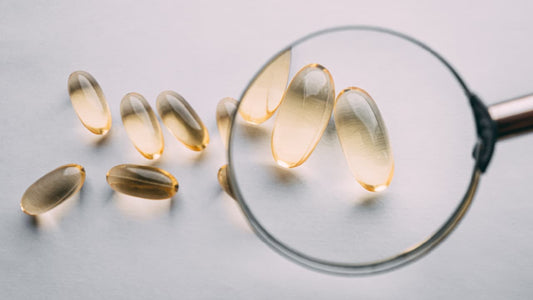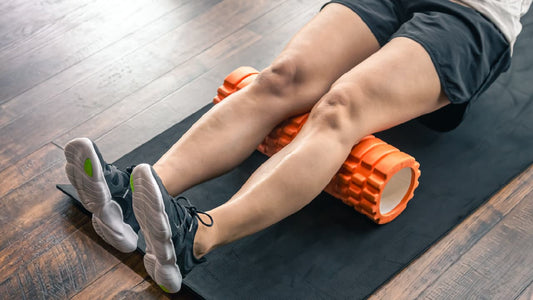Are you a bodybuilder? Adding an omega-3 to your sports nutrition supplement stack can be a game-changer. Studies have shown that Omega-3 fish oil can increase thigh muscle volume, making it a valuable addition to your bodybuilding regimen. Omega 3 bodybuilding benefits include support for muscle growth, muscle protection, recovery, joint comfort and more.
This article gives you the scoop on everything you need to know about omega-3s as sports nutrition for bodybuilders, including how much you should be taking for muscle health and why you might want to swap fish oil for algal oil. Let’s get to it!
Key Takeaways
-
Omega-3s offer many benefits for bodybuilders, helping to fight muscle damage, increase muscle size, enhance thigh muscle volume, reduce muscle soreness, support weight loss efforts and more.
-
The US National Institutes of Health recommends 1.1 - 1.6 g of Omega-3s daily; tolerable upper limit is considered to be about 5 grams of Omega-3s daily.
-
Bodybuilders should aim for higher Omega-3 intake – between 3 grams and 6 grams daily, with 2-3 grams as EPA/DHA – to get the best athletic benefits.
-
A 2:1 ratio of EPA to DHA appears to be most beneficial for supporting muscle health and comfort. 1:1 is also in acceptable range.
-
It can be challenging for bodybuilders to consume enough Omega-3s from diet alone, so many will turn to fish oil supplementation to up their intake.
-
Fish oil supplements are good, but consuming them in large amounts may have side effects and environmental concerns. Algae-based Omega-3 supplements are a better choice.
What are Omega-3s?

Omega-3s fall under essential fatty acids, more commonly called EFAs. While there are several Omega-3s that exist, there are three we focus on:
-
Eicosapentaenoic acid (EPA)
-
Docosahexaenoic acid (DHA)
-
Alpha-linolenic acid (ALA)
Fatty fish like salmon, mackerel, and sardines are rich in EPA and DHA, while plant foods like flaxseeds, chia seeds, and walnuts supply ALA.
While ALA can be converted into EPA and DHA, it's not an efficient process—conversion rates are less than 15%.(1)
Did you know? Marine algae supply EPA and DHA: the same types of Omega-3 fatty acid compounds found in fish oil, but sourced in a more sustainable, plant-based form.
This makes algae-based Omega-3 supplements particularly appealing to vegetarian, vegan and clean-eating athletes and bodybuilders. Learn more about vegetarian Omega-3 sources.
Omega-3 fatty acids are great for overall human wellness, with well-established health benefits for the cardiovascular system, brain, immune function and more.
Omega-3 and bodybuilding might not seem to match at first. While bodybuilders often focus on protein powders, amino acids, pre-workouts and other sports nutrients to help with resistance training, they should know that Omega-3s can offer them many benefits, too -- as long as they hit the right dosages.
Related Post: Omega-3 Benefits for Men
Let's get into the Omega-3 benefits for bodybuilders first, and then discuss dosages that may help with muscle, athletic performance and overall body composition.
Omega-3 Bodybuilding Benefits
Muscle Mass and Skeletal Muscle Protein Metabolism

While more research is needed, some evidence suggests Omega-3s may increase mTOR signaling in muscle cells, thereby helping to stimulate skeletal muscle protein metabolism and increase lean muscle mass. In particular, Omega-3s have been shown to increase thigh muscle volume, which can contribute to overall muscle mass gains. mTOR is a protein that helps muscles grow by managing how they build protein after you eat or exercise.
One review reported that Omega-3 fatty acids may stimulate gains in muscle mass, improve muscle strength, and enhance muscle function.(2)
However, it’s worth noting that the review focused on healthy adults who are older. These older adults are not bodybuilders, so the benefits may not translate as well. But it does suggest potential benefits for age-related muscle mass declines.
Omega-3s may also enhance insulin sensitivity, further supporting muscle growth.
A 2018 study published in the Journal of Nutrition and Metabolism found that 3 g of omega-3 rich krill oil in resistance-trained individuals increased lean mass by 1.4kg over just eight weeks, whereas those taking the placebo didn’t see the same gains.(3)
Promotes Recovery and Reduces Delayed Onset Muscle Soreness

If you're looking to boost muscle strength and maximize muscle growth, your workouts are only part of the whole picture—recovery is the other half.
And while several factors influence recovery—stress, sleep, diet, recovery practices—what's in your recovery stack also influences it. Learn more about muscle recovery for athletes.
Studies have suggested that Omega-3s may be helpful in reducing inflammation and muscle swelling post-workout, which ultimately reduces muscle soreness and helps you bounce back faster.
A 2017 study of 21 men following an 8-week exercise protocol and supplementing 2,400 mg of fish oil (600 mg of EPA and 260 mg of DHA) daily found that those taking the omega-3s had significant reductions in delayed-onset muscle soreness (DOMS) and didn't experience temporary muscle strength loss compared to those not taking fish oil supplements or the placebo.(4)
Similarly, a 2015 study found that women taking 3,000mg of DHA supplements for one week reported 23% less soreness after doing bicep curls than people who didn't take DHA.(5)
While the dose needed to mitigate muscle damage and support recovery is under debate, some experts advise that 6 g/day is sufficient to optimize muscle recovery, while other experts noted better benefits at a dosage of 8 g/day.(6,7)
Bodybuilders work hard in the gym for gains, and the last thing they want is to lose them.
While recovery and diet play critical roles in maintaining muscle mass, research suggests throwing some omega-3s into the mix could help protect against muscle loss—even when it comes time to cut. Learn more about how to train for muscle mass.
Supports Fat Loss

Bulking is great, but few bodybuilders look forward to what follows—the cut.
Cutting calories and ramping up cardio are two sure-fire ways to melt fat and reduce body weight, but what if you could do it more efficiently by adding omega-3s?
One small study found that 6g of fish oil per day for 12 weeks boosted metabolic rate by 3.8%, while another using just 3g/day saw an increase in metabolic rate by a whopping 14%—the equivalent to an extra 187 calories per day.(8,9)
Other studies show that omega-3s can help with fat loss. A study of 44 individuals given 4 g of fish oil per day didn't lose more weight than those taking a placebo, but they did lose 1.1 lbs (0.5 kg) more body fat and gained more muscle.(10)
Enhances Joint Comfort

Omega-3 fatty acids are increasingly recognized for their benefits in joint health, which appeals to bodybuilders.
Those who hit the weights hard often place a lot of stress on their joints due to heavy lifting and repetitive movements, which can lead to inflammation and joint discomfort.
Omega-3 fatty acids, particularly EPA and DHA, have soothing properties that have been shown to help modulate this inflammation and promote comfort in people with joint problems.(11) This benefit would seem to potentially help bodybuilders after intense training.
Safe, natural joint support from EPA and DHA may allow bodybuilders to continue with consistent intense exercise and heavy resistance training with less worry about joint-related injuries slowing them down.
How Much Omega-3 For Bodybuilding?
So how much Omega-3 intake does a bodybuilder need to reap all these benefits
Anywhere from 2,000 mg to 3,000 mg daily may be sufficient for bodybuilders, but doses up to 5,000 mg are well tolerated without side effects.
Some researchers recommend between 6 g and 8 g of Omega-3 fatty acids for muscle benefits, but bodybuilders should carefully select a quality Omega-3 source for safety and comfort at these high dosages.
How much EPA and DHA per day bodybuilding, at what ratio?
A common recommendation for athletes looking to enhance muscle recovery and regulate inflammation might include 2-3 grams EPA and DHA for bodybuilding each day.
They should be presented at a 1:1 or 2:1 ratio of EPA to DHA. This ratio is thought to efficiently support muscle recovery and soothe inflammation.
Did you know? According to the European Food Safety Authority (EFSA), daily intakes of up to 5 grams of long-chain omega-3 fatty acids are generally safe for adults, but they should heed potential risks from contaminants like methylmercury and dioxins found in some fish.(12)
What To Look For In Fish Oil Supplements

There's no shortage of omega-3s available on the market, but you'll notice the majority of them come from one source: fatty fish.
This makes sense; most research on Omega-3 fatty acids will use a fish oil supplement. However, omega-3 fish and processing methods may have some issues that make fish oil less appealing.
Fish oil supplements are facing a decline in demand due to growing health and environmental concerns.
The harvesting of fish for oil can lead to overfishing and negatively impact marine ecosystems.
Additionally, fish oils are susceptible to contamination with heavy metals like mercury, which poses health risks, especially for those who are sticking to fish oil supplementation on a daily basis.
Of course, there are many high-quality fish oil pills on the market.
But due to their source, even the best fish oil supplements can have issues with odor, rancidity, fishy burps, stomach discomfort and other concerns. Learn more about the truth behind fish oil supplements.
In response to fish oil concerns, many bodybuilders are switching to plant-based Omega-3 supplements -- especially those made from clean marine algae -- to help them build muscle.
The shift to algae-sourced Omega-3 supplements not only aligns with a growing preference for plant-based diets but also represents a more ecologically responsible approach to supplementing omega-3 intake.
Best Omega-3 Supplement for Bodybuilders
Performance Lab® Omega-3: Clean Algae-Sourced Brain Supplement

Today's most advanced Omega-3 supplement: Ultra-clean and vegan "good fats" sourced from eco-friendly marine algae -- not fish.
Performance Lab® Omega-3 is today's most sophisticated “healthy fat” supplement for bodybuilders to take. Each serving of three NutriGels® supplies 1800 mg algal oil, which includes EPA and DHA:
-
DHA (Docosahexaenoic Acid), 540 mg
-
EPA (Eicosapentaenoic Acid), 270 mg
Beyond its EPA and DHA benefits for muscle strength and workout performance, this Omega-3 supplement is a top choice for bodybuilders because it is clean: No fishy smell, fishy aftertaste or gastric distress. No mercury, heavy metals, PCBs, or toxins (unlike some fish oil products!). Just premium life’s™OMEGA algal oil in vegan-friendly, carrageenan-free NutriGels®.
Bonus - Top Pre-Workout to Stack with Omega-3: Pre Lab Pro®

Omega-3s offer far-reaching benefits to bodybuilders when taken over time. But what about support for a single high-intensity workout? That's where Pre Lab Pro® comes in.
This nootropic-driven pre-workout formula with moderate-dose caffeine and amino acids delivers a clean surge of energy and focus for the gym without any jitters, side effects or crashes. It is the ideal pre-workout for any sport nutrition regimen that includes Omega-3s.
Ingredients: Red Beetroot Powder; Setria® Performance Blend; Natural Caffeine; L-Theanine; L-Tyrosine; Vitamin D3, Potassium and Iron (all as NutriGenesis®), Himalayan Pink Salt. Delicious natural berry flavor.
Together, Pre Lab Pro and Omega-3s work in harmony to support all phases of muscle building -- from amped-up performance in the gym, to soothing comfort and faster recovery while building new muscle tissue afterwards.
Conclusion
Omega-3 fatty acids, especially EPA and DHA, are increasingly recognized as a crucial supplement for any bodybuilder sport nutrition regimen.
Not only do they help ease inflammation and enhance heart health, but they also play a significant role in helping bodybuilders to maintain muscle tissue.
Omega-3s aid in decreasing muscle soreness after workouts, support muscle protein synthesis, and may help mitigate the muscle breakdown that can occur with intense bodybuilding training.
By incorporating an appropriate dosage of omega-3 supplements into their regimen—tailored to their specific dietary and training demands—bodybuilders can optimize both their performance and their recovery processes.
Incorporating Omega-3s into your diet can also lead to increased thigh muscle volume, providing a well-rounded benefit for bodybuilders.
Taking omega-3 fatty acids strategically can help ensure that bodybuilders can maintain peak functionality in training sessions and achieve superior results in their muscle-building goals.
- Gerster H. Can adults adequately convert alpha-linolenic acid (18:3n-3) to eicosapentaenoic acid (20:5n-3) and docosahexaenoic acid (22:6n-3)? Int J Vitam Nutr Res. 1998;68(3):159-73. PMID: 9637947.
- Smith GI. The Effects of Dietary Omega-3s on Muscle Composition and Quality in Older Adults. Curr Nutr Rep. 2016 Jun;5(2):99-105. doi: 10.1007/s13668-016-0161-y. Epub 2016 Apr 2. PMID: 27398264; PMCID: PMC4936484.
- Georges J, Sharp MH, Lowery RP, Wilson JM, Purpura M, Hornberger TA, Harding F, Johnson JH, Peele DM, Jäger R. The Effects of Krill Oil on mTOR Signaling and Resistance Exercise: A Pilot Study. J Nutr Metab. 2018 Apr 26;2018:7625981. doi: 10.1155/2018/7625981. PMID: 29854443; PMCID: PMC5944280.
- Ochi E, Tsuchiya Y, Yanagimoto K. Effect of eicosapentaenoic acids-rich fish oil supplementation on motor nerve function after eccentric contractions. J Int Soc Sports Nutr. 2017 Jul 12;14:23. doi: 10.1186/s12970-017-0176-9. PMID: 28717347; PMCID: PMC5508798.
- Corder KE, Newsham KR, McDaniel JL, Ezekiel UR, Weiss EP. Effects of Short-Term Docosahexaenoic Acid Supplementation on Markers of Inflammation after Eccentric Strength Exercise in Women. J Sports Sci Med. 2016 Feb 23;15(1):176-83. PMID: 26957941; PMCID: PMC4763838.
- VanDusseldorp TA, Escobar KA, Johnson KE, et al. Impact of Varying Dosages of Fish Oil on Recovery and Soreness Following Eccentric Exercise. Nutrients. 2020;12(8):2246.
- Tinsley GM, Gann JJ, Huber SR, et al. Effects of Fish Oil Supplementation on Postresistance Exercise Muscle Soreness. J Diet Suppl. 2017;14(1):89-100.
- Couet C, Delarue J, Ritz P, Antoine JM, Lamisse F. Effect of dietary fish oil on body fat mass and basal fat oxidation in healthy adults. Int J Obes Relat Metab Disord. 1997;21(8):637-643.
- Logan SL, Spriet LL. Omega-3 Fatty Acid Supplementation for 12 Weeks Increases Resting and Exercise Metabolic Rate in Healthy Community-Dwelling Older Females. PLoS One. 2015;10(12):e0144828.
- Noreen EE, Sass MJ, Crowe ML, Pabon VA, Brandauer J, Averill LK. Effects of supplemental fish oil on resting metabolic rate, body composition, and salivary cortisol in healthy adults. J Int Soc Sports Nutr. 2010;7:31.
- Cordingley DM, Cornish SM. Omega-3 Fatty Acids for the Management of Osteoarthritis: A Narrative Review. Nutrients. 2022 Aug 16;14(16):3362. doi: 10.3390/nu14163362. PMID: 36014868; PMCID: PMC9413343.
- https://www.efsa.europa.eu/en/press/news/120727














